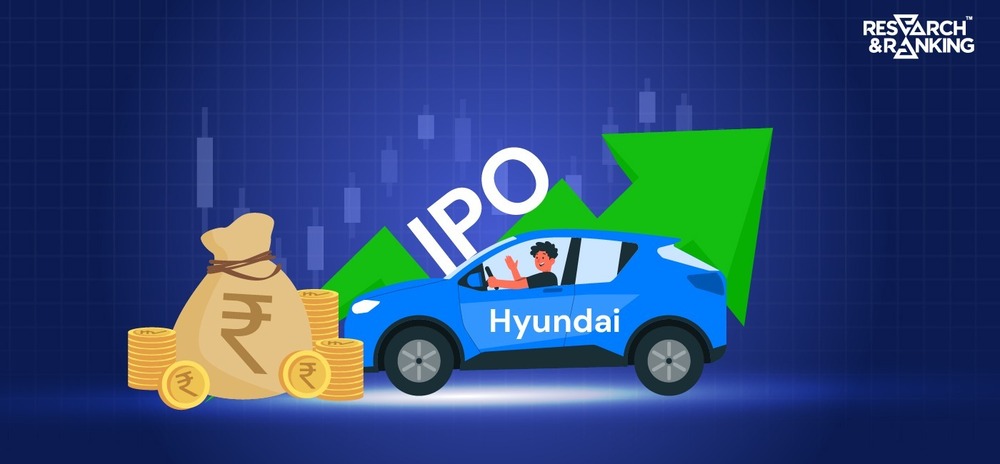For 28 years, India has zoomed around in Hyundai’s cars since its launch here in 1996. Now, the motor company is revving its engines for an ambitious ride on the Indian stock market with an IPO valued at a potential $3 billion!
More than a financial move, with the IPO, the South Korean auto giant is shifting gears to conquer new territories, captivate the Indian market, and secure a premium valuation.
Why India?
Well, why not India? We have everything going for us that will benefit Hyundai. Firstly, the immense potential the Indian automotive industry has. The economy is booming, the middle class is growing, people have more disposable incomes, and the younger generation is looking for luxury. So, car sales are expected to skyrocket in the coming years.
Hyundai is already the second-largest carmaker in the country, with a 15% market share, and wants to capitalize on this wave to become the undefeated leader.
Source: Promote Digitally
As Hyundai considers a valuation of $30 billion in India, the business here might be worth more than half the company and its current market cap in Korea. This news fueled a 5% stock surge, pushing their price to a three-year high.
Why an IPO?
The answer is simple: funding. The IPO will provide Hyundai with the financial muscle to:
- Expand its manufacturing – Currently, Hyundai has two plants in India. The IPO funds will allow them to build new facilities, increase production capacity, and cater to the growing demand.
- Launch new models focusing on electric vehicles (EVs), which is important for navigating India’s increasingly strict emission norms and the growing global demand for sustainable transportation. Hyundai has already announced plans to launch six EVs in India by 2024.
- Take on rivals – Maruti Suzuki, the current market leader, is a stiff competitor. The IPO funds will give Hyundai the resources to invest in research and development, improve marketing strategies, and offer more competitive products.
- Boost brand image – A successful IPO can significantly enhance Hyundai’s brand image and reputation in India, attracting more customers and investors.
Beyond the Numbers
The IPO is also strategically addressing the “Korea discount” phenomenon. Korean companies often trade at lower valuations than their global counterparts. A successful IPO in India, with a potentially higher valuation, could set a benchmark for other Korean companies and help them overcome this “discount.”
Also, while KOSPI, Hyundai’s home country, South Korea’s stock market, has climbed a decent 30% in the past four years, it’s just not as exciting as India’s skyrocketing growth – the benchmark indices have doubled. So, Hyundai wants to jump on this momentum and raise a whopping $3 billion by selling shares in India, hoping to get a bigger piece of the pie in this booming market.
The Road Ahead
The success of the IPO depends on several factors. Effective marketing, building investor confidence, and navigating the regulatory landscape are crucial. Additionally, Hyundai needs to ensure its EV strategy resonates with Indian consumers and that its new models are well-received.
What it Means for India
The IPO could prove to be a symbiotic relationship. For the Indian consumer, it could mean more choices, better competition, and potentially faster adoption of EVs. It could also lead to increased employment opportunities and contribute to the growth of the Indian economy.
It could be an exciting opportunity to participate in the growth of the Indian automotive industry and a leading global carmaker.
Hyundai’s IPO in India is more than just a financial transaction. It’s a strategic move for the company, the Indian automotive industry, and the Indian economy as a whole.
Know more about
IPO | Current IPO | Upcoming IPO | Listed IPO
*Disclaimer Note: The securities quoted, if any, are for illustration only and are not recommendatory. This article is for education purposes only and shall not be considered as recommendation or investment advice by Research & Ranking. We will not be liable for any losses that may occur. Investment in securities market are subject to market risks. Read all the related documents carefully before investing. Registration granted by SEBI, membership of BASL, and certification from NISM in no way guarantee the performance of the intermediary or provide any assurance of returns to investors.
How useful was this post?
Click on a star to rate it!
Average rating 4 / 5. Vote count: 1
No votes so far! Be the first to rate this post.
I’m Archana R. Chettiar, an experienced content creator with
an affinity for writing on personal finance and other financial content. I
love to write on equity investing, retirement, managing money, and more.
-
Archana Chettiarhttps://www.equentis.com/blog/author/archana/
-
Archana Chettiarhttps://www.equentis.com/blog/author/archana/
-
Archana Chettiarhttps://www.equentis.com/blog/author/archana/
-
Archana Chettiarhttps://www.equentis.com/blog/author/archana/

